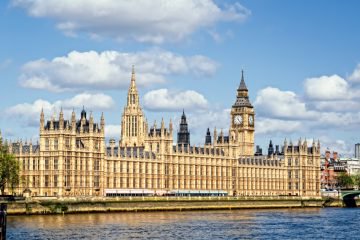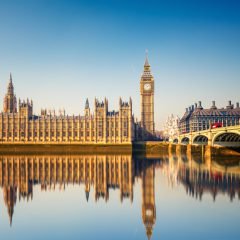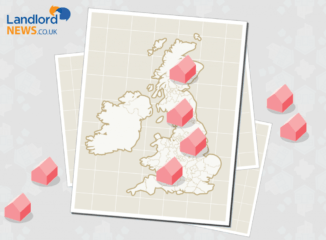UK house prices continue to increase, according to the Government’s latest UK House Price Index.
The annual price change is 10.8% for December 2021, with the monthly price change at 0.8%. Overall, the average price of a property in the UK was £274,712.
Michael Bruce, CEO and Founder of Boomin, comments: “It’s only fitting that house prices should continue to climb in December, as the curtain falls on what has been quite an extraordinary year for the property market.
“However, while the scales of supply and demand remain firmly tipped in favour of the nation’s home sellers, there’s a good chance that the high rate of house price growth seen during the pandemic will now subside, replaced by more incremental gains during the year ahead.”
Kimberley Gates, Head of Corporate Partnerships at Sirius Property Finance, comments: “We’ve seen many buyers push their budget that little bit further over the last 12 months due greater levels of mortgage affordability and a stamp duty saving. This has helped drive top line house price growth across the UK and we’ve seen the market continue to go from strength to strength as a result.
“With interest rates increasing and the opportunity of a stamp duty saving now long gone, we expect to see a more measured market performance over the coming year.
While there’s certainly no reason to panic, the monthly cost of a mortgage will start to climb for those that aren’t locked into a fixed rate and this will impact the price buyers are willing to pay to climb the property ladder.”
Geoff Garrett, Director of Henry Dannell, comments: “The general expectation is that the Bank of England will impose at least two further interest rate increases over the course of this year. This will bring the base rate up to one percent at the very least and while this remains comparably low to historic highs, those on tracker or variable rates will notice the monthly cost of their mortgage climb significantly.
“We’ve already seen a huge uplift in the number of lenders withdrawing or increasing their fixed rate offerings and we believe this will continue. So for those considering a purchase in 2022, it’s important not to overstretch financially and the best plan of action is to enter the market with plenty of breathing room to help absorb this hike in the cost of borrowing.”
Jonathan Samuels, CEO of Octane Capital, comments: “The market remains in fine form having defied all expectations during the pandemic and there is little sign of any significant decline on the horizon.
“Increasing interest rates and a sharp jump in the cost of living will, of course, have some impact.
“We expect this will come in the form of a more conservative approach to borrowing from the nation’s homebuyers in contrast to the gung ho approach seen during much of the pandemic, as they are no longer buoyed by the race for more space and a stamp duty saving.
“The result of which will be a slow in the rate of house price growth rather than a property market crash.”
Chris Hodgkinson, Managing Director of HBB Solutions, comments: “We’re yet to see a let up in the torrential downpour of homebuyer demand that has washed over the property market pretty much since the start of the pandemic. As a result, those looking to sell are achieving a very good price which is driving property values ever higher.
“Current market conditions are so strong that even when transactions are falling through, sellers are securing another buyer immediately and for a higher price than they had agreed during their original sale.
“This won’t last forever though and those entering the market this year should tread with a little more caution. Although demand levels are likely to remain robust, buyers will start to feel the pinch caused by an increase in both the cost of living and borrowing. So sellers who persist with unrealistic asking price expectations will struggle to see them met.”
Marc von Grundherr, Director of estate agent Benham and Reeves, comments: “The market outlook for the year ahead remains positive despite dark cloud gathering in the form of increasing interest rates and an inflated cost of living. While these factors will certainly influence the market to some extent, they are unlikely to dampen our appetite for homeownership and with stock levels remaining insufficient, market values are unlikely to decline anytime soon.
“That said, it is likely that the wider UK market will now shift down a gear or two where the rate of house price growth is concerned, with early signs suggesting that London is once again poised to take house price pole position.
“Buyer demand for central London flats has picked up considerably and this is a very promising sign given it’s really the core segment of the central London market. This growing demand will continue to be bolstered by a return to the workplace and most notably, the return of foreign buyers and renters, with these factors continuing to pull London out of the doldrums where it’s sat for much of the pandemic.”
James Forrester, Managing Director of estate agent Barrows and Forrester, comments: “It’s hard to remember a time when the property market has been firing on all cylinders for such a sustained period and we continue to see numerous areas driving top line market performance forward at quite some rate.
“Of course, this rate of growth isn’t sustainable for ever and we expect to see some natural correction in the coming months. This certainly won’t come in the form of a house price collapse, but those thinking of selling would be wise to do so sooner, rather than later.
“There is currently an incredible shortage of stock available on the market and we’re seeing numerous buyers fight it out over a single property. With such an imbalance, those that do bring their home to market are sure to achieve very close to asking price and, in some cases, quite a bit more.”





